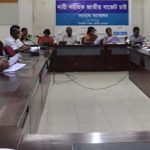Referring the Resolution 12/17 entitled “Elimination of discrimination against women”, adopted by the Human Rights Council at its 12th session in October 2009, office of the UN High Commissioner for Human Rights requested input for the thematic study they have been asked to prepare for the human rights council on discrimination against women, in law and in practice.
Following is the BNPS response to the request of the UNHCHR:
May 12, 2010
Honorable High Commissioner:
We are delighted and encouraged to receive your communication of March 29, 2010 regarding the thematic study on discrimination against women your office has undertaken.
We all know that the governments pledge to repeal all discriminatory laws by 2005 was not met and laws that explicitly discriminate against women unfortunately remain in force in many countries. Like women in other countries Bangladeshi women also demand abolition of all discriminatory laws.
BNPS appreciates your initiative to invite responses from concerned civil society organizations. As a Bangladeshi women organization we would like to take this opportunity to present our following responses to your initiatives:
There have been efforts to try and amend laws that discriminate against women, but much more needs to be done also to ensure laws are enforced.
Even when there are good laws, enforcement is not always strong and women’s access to justice is not always easy.
Governments have committed themselves to promote equality before the law internationally, regionally and through national constitutions, but implementation has been slow.
The CEDAW Committee has done good work, but its mandate is limited to looking at countries every four years. Other UN special mechanisms and human rights bodies have occasionally addressed issues of women’s legal equality, but not in a systematic way. A specific UN focus on women’s equality the law could really help governments accelerate their efforts, sharing best practice, assisting the efforts of national and local civil society organizations to press for very concrete change.
Inequality before the law has very real meaning for women and girls trying to live their lives-being able to have access to work and to be paid equally for it and have equal pension rights, being able to hold political office, having access to legal protection against violence, being able to participate fully in the lives of their families and communities, being able to pass nationality to spouses and children so they too have equal access to e.g. education, healthcare and housing.
There are many other examples of how discrimination in law and access to law has a very real negative impact on the lives of women and girls around the world.
Promoting women’s equality is also Goal 3 of the Millennium Development Goals. The feminisation of poverty is something that is not given enough attention. The situation for those most disadvantaged has become worse with the global credit crunch. Removal of barriers to legal equality will help address this issue and enable women to participate more fully in the social, economic, political and cultural spheres of file.
We hope our concerns will be reflected in this thematic study and your effort will play positive role to end discrimination against Bangladeshi women along with our sisters all over the globe.
We appreciate your initiative and wish you success.
Yours sincerely,
Rokeya Kabir
Executive Director
Bangladesh Nari Progati Sangha (BNPS)


